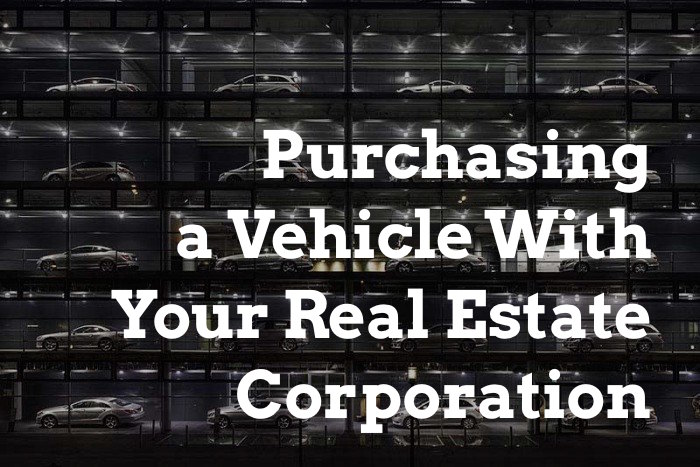When we found out we were expecting Bruce, the first thing we did to get prepared was trade in my small sedan for an 8-seat minivan.
It is a nice and highly rated van, big enough to accommodate our growing family but also affordable.
For business purposes, this van is excellent when my husband, Mr. Hamilton, takes clients out for tours to different cities.
At the time, we decided to purchase the car in our own name, as opposed to buying it in our corporations.
A few clients asked me if they should own their vehicles in their own names or their real estate corporations.
This really depends on how often you use your vehicles on your real estate portfolio.
Say you have a full-time job and you don’t have any other businesses besides your real estate portfolio, if you purchase the car in your own name, you have two ways to claim your expense through your real estate corporation.
You can claim it using the mileage method. All you would need to do is have an app similar to MileIQ (see it here) that could function as a logbook to record the mileage of the vehicle, on the trips you made for your rental corporation. Based on the mileage you have driven, you are allowed to claim 55 cents on the first 5,000 km and 49 cents per km in 2015 on anything exceeding that from the corporation.
These rates are deemed reasonable and CRA would not question the reasonability of these rates. Meaning, that you don’t need to keep track of the detail gas receipts, insurance expense and any other automobile expenses you have incurred. (Note, that a detailed log book is still required to prove that the mileage you are claiming is reasonable business use.)
For example, you incurred 6,000km to run your rental corporation. Based on the mileage allowance method, you can claim $3,240 ($0.55 x 5,000 + $0.49 x 1,000) from the corporation. The real estate corporation can deduct this $3,240 as an expense and yet you don’t personally need to report it as income.
You can also choose to use the detailed method. This means that you will have to keep all the detailed receipts as noted in the blog post here, keep a log book, including the mileage you have driven your car for the full year. At the end of the year, prorate the expenses based on the mileage you have driven for business purpose in relation to the annual mileage you’ve driven.
We have another option – we can own the vehicles in the corporation’s name, but this gets a whole lot more complicated!
From the corporation’s point of view, the personal use portion of automobile expenses would not qualify for deduction. If you incur $10,000 of automobile expenses in total, and 70% of the time you use the vehicle for personal use, only $3,000 can be deducted as expense.
From your personal tax return point of view, because the car is available for you to use personally, you are receiving a benefit from the corporation. We call this a standby charge. You have to personally report it in your income and pay tax on this amount.
Depending on how often you drive the car for business purpose, the standby charge is calculated differently.
If you use the vehicle 70% of the time for personal purpose, the standby charge is calculated as 24% of the vehicle value (the purchase price of the vehicle). Say you purchase the vehicle for $40,000, the standby charge is $9,600 (24% x $40,000) annually.
If you used the vehicle 70% of the time for business purpose and the mileage you’ve driven for personal use is less than 1,667km per 30 day period or a total of 20,004km for the year, you may be able to reduce the standby charge.
The reduced standby charge is prorated by the percentage of your business use, the lesser the personal use, the lesser the standby charge.
Formula to calculate the reduced standby charge:
Personal use per kilometer × the number of months the car was available to you × standby charge calculated above
Oh yes! It can get pretty complicated!
We generally don’t advise clients to own the car in the corporation unless the client used the car almost exclusively for business purpose.
Of course, the taxpayer will also have to keep proper record, especially a detailed mileage logbook, to ensure well supported deductions for your properties.
Until next time, happy real estate investing!
Cherry Chan, CPA, CA
Your Real Estate Accountant






paul
Hi Cherry,
Thanks for the article, it is always insightful. In your mileage allowance method example where you can claim $3,240, does the person have to pay personal taxes on the $3,240? In other words, since the $3,240 is a corporate expense paid to the person, does he/she need to pay taxes on it? Thank you again.
Cherry Chan
If you use the mileage method, the individual taxpayer does not need to report the allowance received as income